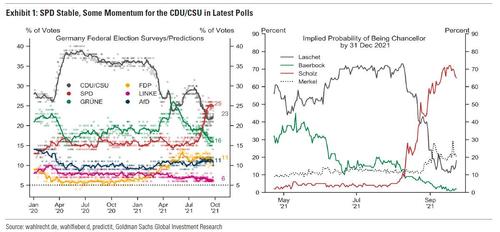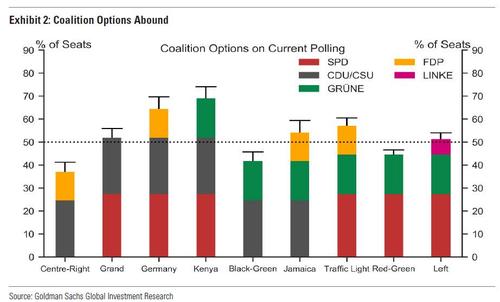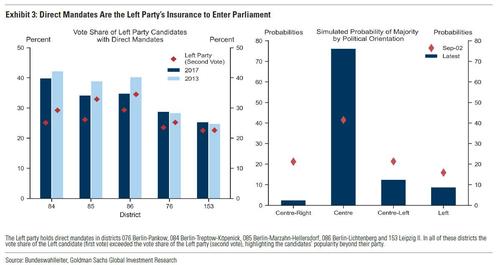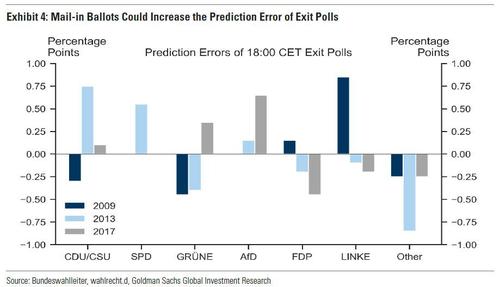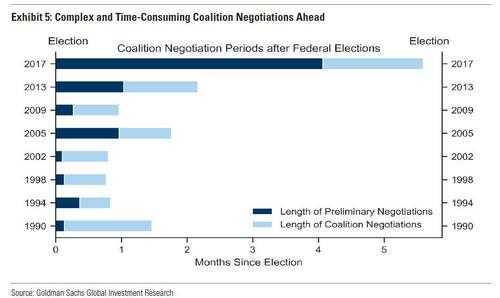Polls have opened in Germany, where voters are choosing a new parliament in an election that will determine who succeeds Chancellor Angela Merkel after her 16 years at the helm of Europe’s biggest economy. And as Germans set out to vote, the latest polls confirm the lead of the center-left SPD over the CDU/CSU, despite some recent positive momentum for the conservatives. The election outcome remains unusually open with both SPD- and CDU-led options remaining feasible. The SPD will likely have a better bargaining position if a Left government (SPD, Greens, Left party) is feasible.
Polling stations close at 18:00 CET on Sunday at which point exit polls will be published, assuming of course the outcome has not already been “predetermined” – on Friday German public television station, ARD, erroneously aired the results of the national election on Friday, two days early. The debacle occurred during the airing of the quiz show “Gefragt, gejagt”, which translates to “Asked, hunted,” when a banner popped up on the bottom of the screen. According to the banner, the Union parties would get 22.1%, the Social Democratic Party 22.7%, the Alternative for Germany 10.5%, and the Free Democratic Party 13.2% of the vote in Germany’s national election.
Heute ist Freitag, der 24.09.2021. Müssen wir beunruhigt sein, wenn bei #gefragtgejagt in der #ARD bereits Hochrechnungen zur Bundestagswahl durchs Bild laufen? 🤔
Wissen die schon wieder mehr als wir? 🤫 pic.twitter.com/4YkYg5hTah— Der Online-Wunschbrunnen (@_wunschbrunnen) September 24, 2021
Prediction errors are typically small, but could increase in this election due to the expected large share of mail-in ballots: this year organizers expect as many as 50 percent mail-in ballots, as COVID19 infections are rising.
German election organizers expect as many as 50 percent mail-in ballots, as #COVID19 infections are rising. Far-right politicians are falsely promoting the same allegations of fraud as happened in the U.S.https://t.co/8ZkCpYD8qv
— DW Deutsche Welle (@DeutscheWelle) August 17, 2021
The leading candidates of the main parties meet in a TV debate at 20:15 CET, and pundits will be watching for any cues on preferred coalition options, but don’t expect that any arrangements will be ruled out.
For those hoping for a quick and clear outcome, don’t: Election night is unlikely to produce a clear winning coalition. Following a narrow result there will be a period of high uncertainty as both the SPD and the CDU are likely to hold preliminary talks on governing options. Historical precedent suggests that this process can take up to a month. Once negotiations for a specific coalition start, the focus will shift to the future government agenda. While the law does not set a deadline for this process, efforts will be made to form a new government before Christmas as work on the 2023 draft budget will start early next year.
Below we present a detailed guide to election night and beyond courtesy of Goldman Sachs,
What Do the Latest Polls Say?
Latest polls largely confirm the trend of the last two to three weeks with the centre-left SPD maintaining its lead over the conservative CDU/CSU (Exhibit 1). Accordingly, prediction markets continue to attach around 65% probability to a Scholz chancellorship. That said, CDU/CSU has seen some upward momentum over the past week. Moreover, unusually volatile opinion polls in the run-up to the elections as well as the expected record-share of mail-in votes make the election outcome more difficult to call than in the past. A CDU-led government therefore remains possible.
That said, a Jamaica coalition (with the Greens and the “yellow” FDP) is the CDU’s only option to lead the next government as long as the SPD comes first (Exhibit 2). The SPD on the other hand can potentially choose between a Traffic Light coalition (with the Greens and FDP) or a Left majority (with the Greens and Left party). Other options will be numerically feasible but would involve a further collaboration between the SPD and CDU/CSU which would be very unpopular with the SPD’s membership and, hence, less likely than the aforementioned coalitions.
A larger set of coalition options will likely be an asset in post-election negotiations. The SPD’s bargaining position depends in particular on a majority for a left government (SPD, Greens, Left party). This majority would be jeopardized if the Left did not enter parliament by falling short of the 5% minimum vote share and winning direct mandates in less than three districts. While the former is possible, the latter seems unlikely given the popularity of Left candidates in at least three Berlin districts (Exhibit 3, left). If the Left party did not enter parliament and SPD and Greens did not have a majority by themselves, this would raise the conditional probability of a Jamaica coalition at the expense of a Traffic Light coalition.
What Happens on Election Night?
- 18:00 CET. Polling stations close, at which point public TV networks ARD and ZDF publish exit polls. Prediction errors have been well within one percentage point of the final result across the three last elections. However, the higher expected share of mail-in ballots could increase the prediction error as exit polls only reflect in-person voting behavior whereas mail-in voting behavior is gauged by less precise phone interviews.
- 18:15 CET. First forecasts based on vote counts are usually published within 15 minutes of the polling stations closing with similarly small error margins compared to exit polls in past elections. These forecasts are updated regularly throughout the night (initially 5 to 6 times per hour). Watch the races for the direct mandates in districts 076, 084, 085, 086 and 153, which the Left party won in 2017. If the Left party fails to secure at least three out of these districts and does not clear the 5% minimum threshold, it would drop out of parliament, worsening the SPD’s bargaining position at the expense of the CDU/CSU.
- 20:15 – 21:15 CET. The leading candidates of the parties that are likely to enter the Bundestag meet in a TV debate (broadcast by ARD and ZDF) dubbed the ‘elephants’ round’. This is the first high-level analysis of the election result and we will be watching for any cues on potential coalition options. While preferences might be expressed, don’t expect any options – such as a red-green-red government – to be ruled out at this stage.
- 3:00 – 5:00 CET, Monday. The preliminary official result is published.
What Happens After Election Night?
Election night is unlikely to produce a clear winning coalition and the path to a new government could be lengthy. The first step involves high-level talks about potential government options (so-called ‘Sondierungsgespräche’). If a Jamaica, Traffic Light and Left coalition are all feasible, Goldman expects talks for several options to proceed in parallel. In past elections, this stage has taken between 2 and 4 weeks (Exhibit 5). Once a leading option emerges, the second stage of the government formation process entails detailed coalition negotiations among the potential future government parties. At this point, broad political uncertainty will likely give way to policy uncertainty.
While there is no constitutional deadline to form a new government, there is political pressure to avoid the events of 2017, where the process lasted almost 6 months, because negotiations for a Jamaica coalition collapsed in December. Further, a government will need to be in office by early 2022 to start planning the 2023 draft budget. We therefore think that efforts will be made to conclude negotiations before Christmas.
Although the negotiation outcome is difficult to anticipate, we are looking for a more expansionary fiscal stance on any of the leading three-party outcomes compared to current policies. A Jamaica coalition would feel most committed to fiscal rules according to Goldman whose fiscal scenarios imply limited additional issuance on this outcome (EUR 50bn or 1.5% of GDP) over the next four years and a boost to the level of GDP of 0.5% relative to current policies (Exhibit 6). Under a Traffic Light coalition, the bank looks for somewhat larger incremental debt-issuance (EUR 75bn or 2.1% of GDP), lifting GDP by an additional 0.9%. Debt issuance could be much larger under a Left government (EUR 130bn or 3.6% of GDP).

